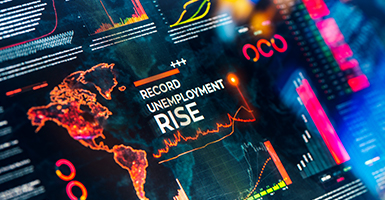Despite the dire outlook for natural resources companies due to various coronavirus-related concerns, Franklin Equity Group’s Fred Fromm explains why he thinks select companies are in much better shape than during the last economic downturn. He also shares why he is paying particular attention to liquidity and the ability of companies to survive until supply and demand balances improve.
As COVID-19 continues to spread, and governments take increasingly aggressive actions to contain the virus, the short-term outlook for the global economy and commodity demand has deteriorated significantly. In our view, the situation remains fluid, and it is difficult to predict the duration and ultimate impact of the virus.
Commodity demand has suffered and will continue to do so as economic activity around the world slows considerably, and inventories will climb as a result. When combined with the potential for persistent changes in consumer behaviour following the outbreak, the situation could maintain pressure on commodity prices for several months and perhaps longer.
That said, a rapid response by select energy and raw materials producers has resulted in supply curtailments for some commodities and has partially offset these adverse demand factors. Companies have begun reining in investment to conserve cash, and some countries are shuttering operations to limit the spread of the virus. In some cases, oil producers will be forced to reduce or cease production for lack of storage capacity in the face of demand weakness.
Crude oil will be one of the most heavily impacted commodities as prices received another blow in March when Saudi Arabia and Russia failed to agree on supply reductions in an effort to offset demand destruction resulting from government efforts to contain COVID-19. On the contrary, apparently in response to Russia’s lack of cooperation, Saudi Arabia abruptly announced a plan to increase production and exports while lowering official selling prices to customers in an effort to take market share. This action was announced despite indications that a deal could be reached and a clear necessity to reduce supply in order to avoid swelling global inventory at a time when supplies are already ample.
Both of these actions were significant and unexpected deviations from prior curtailment policies that appeared to have ended a three-year coalition and had an immediate negative impact on oil prices and related securities. Ultimately, we believe this new unconstrained strategy will inflict significant fiscal damage on Organization of Petroleum Importing Countries (OPEC) countries and Russia. Their heavily oil-dependent government budgets cannot achieve balance with oil prices hovering around the 18-year lows we were seeing as April got underway.
In our view, the potential still exists for an agreement to be reached and recent news stories appear to suggest that may be the case. However, if this does not occur, US production growth will likely continue to decline, after the most recent available data shows production fell in December and January following a prolonged period of rapid growth.
The global macroeconomic outlook, in addition to the recovery in specific sectors, will be critical in determining the shape of the rebound in oil demand, which will likely be down sharply in April and May, though it could have a strong seasonal rebound in the second half of the year. This, in turn, will inform the necessary level of oil production to balance supply and demand and allow prices to return to healthier levels.
Investment Implications
As a result of this unprecedented combination of demand and supply shocks, investing in commodity-linked equities is particularly challenging at this time. However, we expect the same basic tenets of natural resources sector investing to hold true over the long term—namely, the necessity for commodity prices to remain at levels that incentivise investment in resources that deplete over time.
In our view, it is of critical importance to determine the commodity price level discounted in share prices. Making these determinations is not an exact science, which is why we use ranges that have proven to be a fairly accurate indication of how investors value the securities over time. Although periods of security-price deviation from these “intrinsic value” levels can occur, they usually do not persist for long and can present attractive buying opportunities.
We believe this is the situation we find ourselves in today, particularly with energy-focused stocks appearing to reflect US benchmark oil prices below US$35 per barrel. In our view, this price level will result in a continued decline in US onshore production (and likely that of other countries). US shale oil production now represents about 10% of total global supply, and faces significantly higher-than-average decline rates (the rate at which production of wells or oil basins decline annually).
Several exploration and production companies have already announced significant spending declines on the order of 30%–40% from previous guidance, which was already expected to be down 10% from 2019. In addition, the larger energy conglomerates (within the integrated oil and gas industry) are beginning to provide similar updates with more moderate estimated declines in the 20%-25% range, though their reduction in US spending plans will likely be much steeper. This may not matter near term, while demand is weak or falling under the extraordinary circumstances of COVID-19. However, as the world economy recovers, we believe we are likely to see oil demand rebound with a concomitant rise in prices and related equities—and perhaps strongly.
Despite the dire outlook resulting from coronavirus-related concerns, energy fundamentals at the company and industry levels have seen marked improvement, with operations, balance sheets and hedging positions in much better shape than during the last downturn from June 2014 to January 2016.
In addition, there was a significant curtailment of US drilling and completion activity in late 2019 that has extended into 2020, and has begun to accelerate. As US production declines, it will herald a very important reversal in trends witnessed over the past couple years as US production expanded at a rapid pace and pressured oil prices.
According to our analysis, many metals and mining companies, while also susceptible to the unprecedented impact to the world economy, are in strong positions given management teams’ reticence to invest in large projects over the past several years, which led to a strengthening in balance sheets. In our view, well-capitalised companies should therefore be able to withstand the short-term demand shock and may benefit from various stimulus measures that governments employ to help restart economic activity.
Similar to our experience during the global financial crisis in 2008, we believe consolidating holdings into the highest-quality companies while seeking to increase exposure on weakness will prove to be the right approach, even though it may have a negative impact on performance in the short term.
Franklin Templeton Key risks & Disclaimers:
Important Legal Information
This material is intended to be of general interest only and should not be construed as individual investment advice or a recommendation or solicitation to buy, sell or hold any security or to adopt any investment strategy. It does not constitute legal or tax advice.
The views expressed are those of the investment manager and the comments, opinions and analyses are rendered as of publication date and may change without notice. The information provided in this material is not intended as a complete analysis of every material fact regarding any country, region or market.
Data from third party sources may have been used in the preparation of this material and Franklin Templeton (“FT”) has not independently verified, validated or audited such data. FT accepts no liability whatsoever for any loss arising from use of this information and reliance upon the comments, opinions and analyses in the material is at the sole discretion of the user.
Products, services and information may not be available in all jurisdictions and are offered outside the U.S. by other FT affiliates and/or their distributors as local laws and regulation permits. Please consult your own professional adviser or Franklin Templeton institutional contact for further information on availability of products and services in your jurisdiction.
Issued in the U.S. by Franklin Templeton Distributors, Inc., One Franklin Parkway, San Mateo, California 94403-1906, (800) DIAL BEN/342-5236, franklintempleton.com—Franklin Templeton Distributors, Inc. is the principal distributor of Franklin Templeton’s U.S. registered products, which are not FDIC insured; may lose value; and are not bank guaranteed and are available only in jurisdictions where an offer or solicitation of such products is permitted under applicable laws and regulation.
CFA® and Chartered Financial Analyst® are trademarks owned by CFA Institute.
What are the risks?
All investments involve risks, including possible loss of principal. The value of investments can go down as well as up, and investors may not get back the full amount invested. Stock prices fluctuate, sometimes rapidly and dramatically, due to factors affecting individual companies, particular industries or sectors or general market conditions. Investing in the natural resources sector involves special risks, including increased susceptibility to adverse economic and regulatory developments affecting the sector. Growth stock prices may fall dramatically if the company fails to meet projections of earnings or revenue; their prices may be more volatile than other securities, particularly over the short term. Smaller companies can be particularly sensitive to changes in economic conditions and have less certain growth prospects than larger, more established companies and can be volatile, especially over the short term. Investing in foreign companies involves special risks, including currency fluctuations and political uncertainty.
MeDirect Disclaimers:
This information has been accurately reproduced, as received from Franklin Templeton Investment Management Limited (FTIML). No information has been omitted which would render the reproduced information inaccurate or misleading. This information is being distributed by MeDirect Bank (Malta) plc to its customers. The information contained in this document is for general information purposes only and is not intended to provide legal or other professional advice nor does it commit MeDirect Bank (Malta) plc to any obligation whatsoever. The information available in this document is not intended to be a suggestion, recommendation or solicitation to buy, hold or sell, any securities and is not guaranteed as to accuracy or completeness.
The financial instruments discussed in the document may not be suitable for all investors and investors must make their own informed decisions and seek their own advice regarding the appropriateness of investing in financial instruments or implementing strategies discussed herein.
If you invest in this product you may lose some or all of the money you invest. The value of your investment may go down as well as up. A commission or sales fee may be charged at the time of the initial purchase for an investment and may be deducted from the invested amount therefore lowering the size of your investment. Any income you get from this investment may go down as well as up. This product may be affected by changes in currency exchange rate movements thereby affecting your investment return therefrom. The performance figures quoted refer to the past and past performance is not a guarantee of future performance or a reliable guide to future performance. Any decision to invest in a mutual fund should always be based upon the details contained in the Prospectus and Key Investor Information Document (KIID), which may be obtained from MeDirect Bank (Malta) plc.



